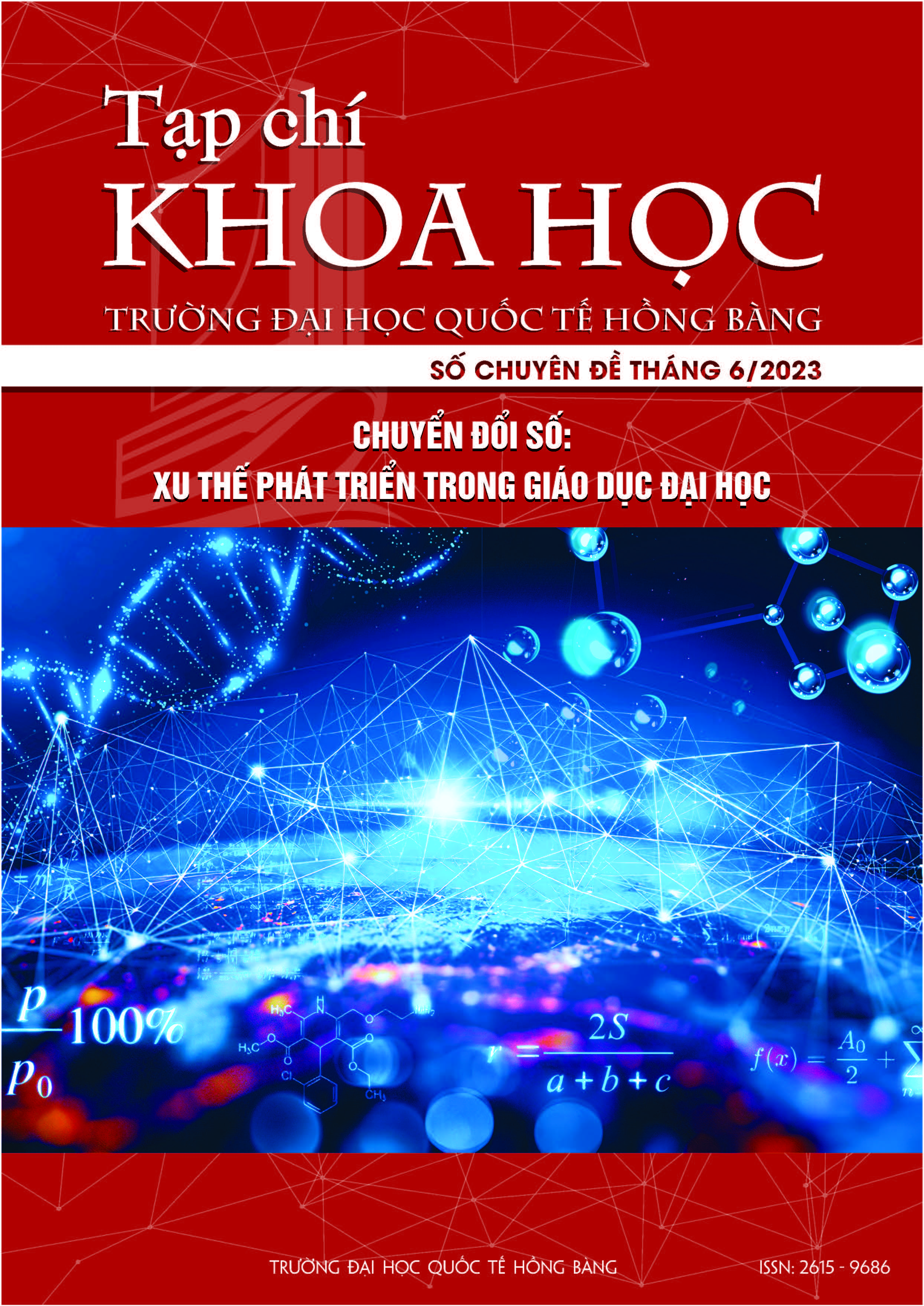Chuyển đổi số trong hoạt động giáo dục ở các nước và bài học áp dụng tại Việt Nam
Các tác giả
DOI: https://doi.org/10.59294/HIUJS.CDS.2023.372Từ khóa:
Chuyển đổi kỹ thuật số, ngành giáo dục, áp dụng tại Việt NamTóm tắt
Chuyển đổi kỹ thuật số là sự tích hợp của các công nghệ kỹ thuật số vào tất cả các hoạt động của doanh nghiệp và xã hội, dẫn đến những thay đổi cơ bản về cách vận hành trong các tổ chức nhằm tạo ra giá trị cho khách hàng. Chuyển đổi kỹ thuật số tạo động lực quan trọng về tăng trưởng kinh tế và đổi mới trong tất cả các ngành và lĩnh vực. Ngành giáo dục tại các quốc gia phát triển được xem là đầu tàu trong việc áp dụng các công nghệ trong lãnh vực IT. Nghiên cứu tổng kết các kết quả chuyển đổi số trong ngành giáo dục ở các quốc gia phát triển và sử dụng phương pháp tổng hợp các kết quả nhằm đưa ra các đề xuất việc áp dụng cho các trường đại học tại Việt Nam.
Abstract
Digital transformation is the integration of digital technologies into all activities of business and society, leading to fundamental changes in the way organizations operate in order to create value for customers. client. Digital transformation is an important driver of economic growth and innovation across all industries and sectors. The education sector in developed countries is considered a leader in the application of technologies in the IT field. The study summarizes the results of digital transformation in the education sector in developed countries and uses the method of synthesizing the results to make recommendations for application to universities in Vietnam.
Tài liệu tham khảo
[1] McKinsey & Company, Shaping the digital transformation in Europe, final report. A study prepared for the European Commission DG Communications Networks, Content and Technology. This study was carried out for the European Commission by McKinsey & Company Internal identification Contract number: LC-00829081, European Commission DG Communications Networks, Content & Technology, ISBN 978-92-76-19509-2. EU: Publications office of the EU, 2020.
[2] Lina María Castro Benavides, Johnny Alexander Tamayo Arias, Martín Darío Arango Serna, John William Branch Bedoya and Daniel Burgos, “Digital Transformation in Higher Education Institutions: A Systematic Literature Review,” Sensors, 20, 3291, 1-22, 2020. DOI:10.3390/s20113291.
[3] OECD, Supporting the Digital Transformation of Higher Education in Hungary, Higher Education. Paris: OECD Publishing, 2021.
[4] Duong Thi Thai, Ha Trong Quynh, Pham Thi Tuan Linh, “Digital transformation in higher education: an integrative review approach,” TNU Journal of Science and Technology, 226, 9, 139 – 146, 2021. DOI.org/10.34238/tnu-jst.4366.
[5] Hans de Wit and Philip G. Altbach (2023), “International Higher Education for the Future: Major Crises and Post-Pandemic Challenges,” Change: The Magazine of Higher Learning, 55, 1, 17-23, 2023. DOI.org/10.1080/00091383.2023.2151799.
[6] UNESCO, Digital transformation in education in Asia Pacific, 2nd Asia Pacific regional education minister’s conference- #APREMC2022. Bangkok: UNESCO Bangkok Office, 2022.
[7] Díaz-García V, Montero-Navarro A, Rodríguez-Sánchez J-L and Gallego-Losada R, “Digitalization and digital transformation in higher education: A bibliometric analysis,” Frontiers in Psychololy, 13, 1-12, 2022. DOI: 10.3389/fpsyg.2022.1081595.
[8] Nguyen Thi Huong Giang, Pham Thi Thanh Hai, Nguyen Thi Thanh Tu and Phan Xuan Tan, “Exploring the Readiness for Digital Transformation in a Higher Education Institution towards Industrial Revolution 4.0,” International Journal of Engineering Pedagogy, 11, 2, 04-24, 2021. DOI: https://doi.org/10.3991/ijep.v11i2.17515.
[9] Anne Thoring, Dominik Rudolph and Raimund Vogl, “Digitalization of Higher Education from a Student’s Point of View”, in Learning and Collaboration Technologies. Design, Development and Technological Innovation, Zaphiris, P., Ioannou, A., Germany: Springer, Cham, 2018, 294-309.
[10] Emilio Abad-Segura, Mariana-Daniela González-Zamar, Juan C. Infante-Moro and Germán Ruipérez García, “Sustainable Management of Digital Transformation in Higher Education: Global Research Trends,” Sustainability, 12, 2107, 1-24, 2020. DOI:10.3390/su12052107.
[11] Antonio Fernández, Beatriz Gómez, Kleona Binjaku and Elinda Kajo Meçe, “Digital transformation initiatives in higher education institutions: A multivocal literature review,” Education and Information Technologies, online, 01-32, 2023. DOI.org/10.1007/s10639-022-11544-0
[12] Niombo Lomba, Lenka Jančová and Meenakshi Fernandes, Digital transformation. Cost of Non- Europe, Study of European Added Value Unit, EU: the European Added Value Unit, 2022.
[13] Le Duy Binh and Tran Thi Phuong, Digital economy and digital transformation in Vietnam, A Reader Prepared for Roundtable Series on EVFTA, EVIPA and Post-COVID-19 Economic Recovery in Vietnam, Delegation of the E.U to Vietnam. Hanoi: Economica Vietnam, 2020.
[14] Xuan-An Nguyen, Dinh-Hai Luong, Thi-Phuong-Thuy Le, Thi-Diep Hoang and Thu-Giang Tran, “Readiness of Vietnamese High Schools for Digital Transformation and Its Influencing Factors: A Quantitative Study,” Asian Research Journal of Arts & Social Sciences,18,3,157-171, 2022. DOI:10.9734/ARJASS/2022/v18i330351Article no.ARJASS.91908
Tải xuống
Tải xuống: 119












